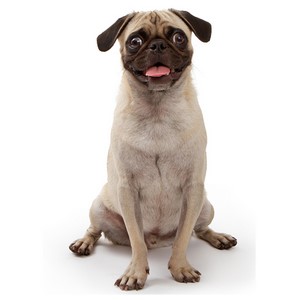Pug Traits
Considering to adopt a Pug and want to know about the personality of a Pug Dogs to help you ensure if a Pug is easy to adapt into your home.
Pug scores  out of 5 in the scale of adaptability compared to other dog breeds.
out of 5 in the scale of adaptability compared to other dog breeds.
Pug Personality
-
Wishing to bring a pet dog into your home? Some pet dog breeds are easier to own than others, especially for novice dog parents.
To identify the easiest pet dog breeds to own, we took a look at a number of important attributes. And you might be shocked by the characteristics that matter most. You might think you want a smart pet dog. Highly intelligent dogs aren't always the simplest to train, because trainability is more about a dog's willingness to follow instructions than his capability to understand them.
You might presume an active dog will be the easiest to keep healthy. But a pet dog with a lower energy level and no genetic predisposition to disease will actually be easier to handle. Additionally, choosing a dog with an easygoing temperament - and minimal grooming needs - will go a very long way toward keeping you sane.
Ready to find the best dog? Have a look at 5 of the easiest dog breeds to own.
Top 5 Easiest Dog's To Own
2. Border Terrier - The border terrier is very "happy," "plucky," and "loving." This dog has a medium energy level but a more laid-back character than many other terriers.
3. Bulldog - If you want a patient and mellow dog, you can't make a mistake with the bulldog. You can successfully train your bulldog - particularly if you use lots of praise and incentives and maintain a sense of humor.
4. Cavalier King Charles Spaniel - They can be faithful hiking partners or shameless couch potatoes, depending on the owner's character - as long as they get a rewarding walk each day.
5. Basset Hound - These medium-sized dogs aren't very active. And while most dog owners won't put the basset hound's hunting prowess to the test, they'll enjoy the breed's sheer patience with children.
What to do if you lose your Pug
If your Pug Dog or any other pet has gone missing and it does not have an identification tag with a phone number, you can:
1. Register your missing pet details at Pet Reunite website here.
2. Report the lost pet on the Local Facebook Lost Pets Groups Here.
3. Telephone the local vet clinics to see if anyone has handed in your lost pet.
4. Call the RSPCA or Visit the RSPCA Lost Pets website and complete a Lost Pet Report.
5. Visit Lost Pets Pages of Animal Pounds.
What to do if you find a lost Pug
If you find a Pug Dog or any other pet and it does not have an identification tag with a phone number, you can:
1. Report the found pet details at Pet Reunite website here.
2. Register the missing pet on the Local Facebook Lost Pets Groups.
3. Contact the Local Council to collect the lost animal.
4. Take the pet to the local Animal Shelter near to your area.
5. Take the pet to the local Vet who usually scan the animal’s microchip and contact the registered pet owner.
Laws Regarding Missing Pets
1. It is against the law to keep any animal that you find.
2. Pets are generally considered property and it is illegal to take and keep someone else’s property.
3. You must call your local animal control unit and file a FOUND AN ANIMAL report for any dog or cat you find.
4. To reclaim your lost dog, cat or other pet from the animal shelter you must pay a release fee.
5. If your dog or cat is unregistered, you will have to register your pet before you can take it home.

